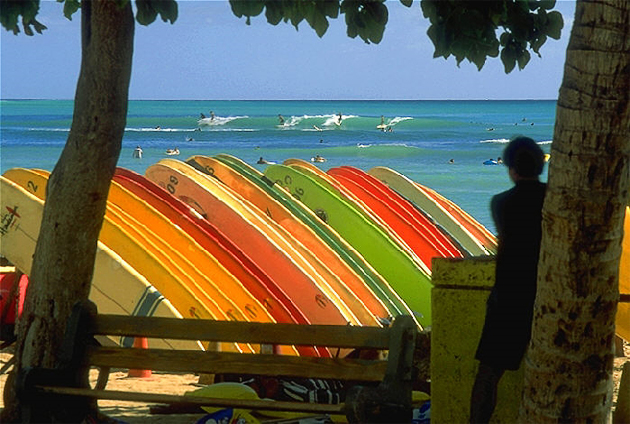Surf is Up for Ecotourism
The world's first non-profit research and teaching center will be housed in SDSUs L. Robert Payne School of Hospitality and Tourism Management.

Take a walk on one of the beautiful beaches in Indonesia, Fiji or Papua New Guinea, and chances are there will be a number of surfers from different countries riding the waves, lying on the beach or getting a bite at a local water-front restaurant. How these and other countries adapt to an influx of surfing tourists is the focus of the world’s first Center for Surf Research, launching this month at San Diego State University.
Desitinations are unprepared
Surf tourism is a rapidly expanding trend throughout the world’s surfable coasts. According to the Surf Industry Manufacturers Association, the American surf industry is worth approximately $7 billion annually and surfing and surf tourism impacts coastal environments in nearly 120 countries. Yet, impoverished coastal communities in the less-developed world have become unprepared and sometimes unwilling hosts to traveling surfers with different cultural norms and values.
According to Jess Ponting, professor in SDSU’s sustainable tourism program and director of the new center, too often, surf destination communities shoulder major social, cultural and environmental costs while seeing relatively little economic benefit.
“Surfing is such an environmentally aware activity. Surfers take great care of the oceans,” Ponting said.
“But they don’t always think about the rest of their surroundings. We want to teach students about sustainable surf travel, to conduct research into sustainable surf tourism management, to provide support for surf tourism operators looking to go green and to support surf tourism destination communities.”
Launching the center
The Center for Surf Research will be a non-profit research and teaching center housed in SDSU’s L. Robert Payne School of Hospitality and Tourism Management. It will host a kick-off symposium, The Audacity of Stoke, at 10 a.m., Sept. 17, at SDSU's Parma Payne Goodall Alumni Center.
The center will lead surf tourism to a more sustainable path by:
- Engaging with the surf industry and surf tourism industry to create a cutting edge research agenda;
- Disseminating specialist knowledge to governments, the surf industry, tourism developers, destination communities, non-profits, and tourists;
- Shaping responsible global citizens through life-changing experiential learning opportunities; and,
- Inspiring active stakeholder engagement with the social and economic development of destination communities, sustainable use of their resources, and conservation of their critical environments.
The center will take students abroad to Peru this winter where they will surf and study the surf tourism culture and its impacts.
Resource for information
Ponting said the Center for Surf Research will disseminate research to government, communities, non-profits and tourists that analyzes and assesses various models of surf tourism management and explores new ways to affect positive change in the practice of surf tourism.
He expects it will develop best practice codes of conduct for all stakeholders in sustainable surf tourism and establish an in-house accreditation/sustainable best practice surf tourism labeling system.
Speakers at the symposium will include:
- Fernando Aguerre, philanthropist
- Rusty Miller (’64), surf legend
- Jon Roseman, co-owner, Tavarua
- Dr. Dave Jenkins, founder of SurfAid
- Steve Barilotti, Surfer Magazine
- Serge Dedina, executive director, Wild Coast
- Surf industry representatives
- A panel of surfer non-profit CEOs
The Center for Surf Research's website, www.csr.sdsu.edu, will be live soon.
San Diego State University opens surfing research center - Los Angeles Times, Sept. 13, 2011



